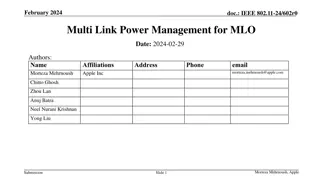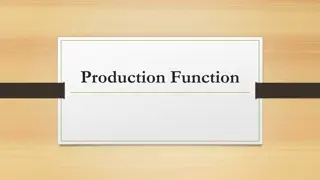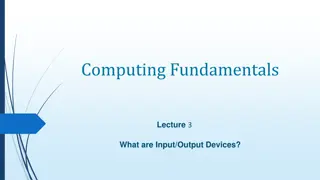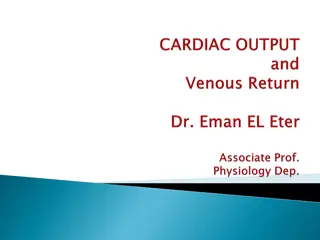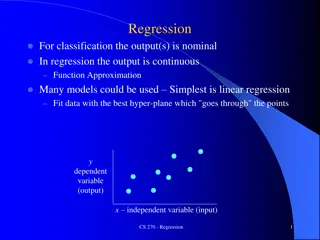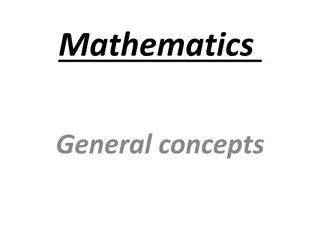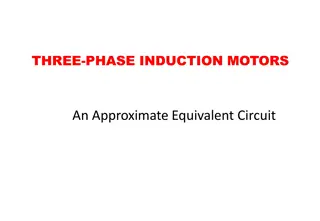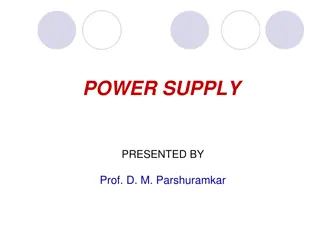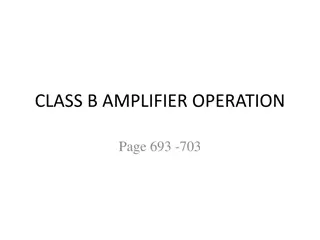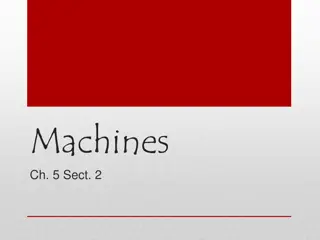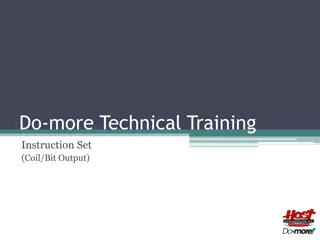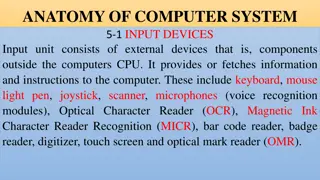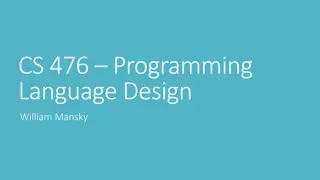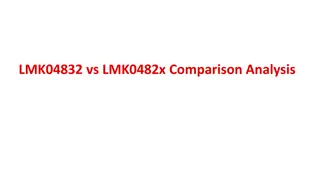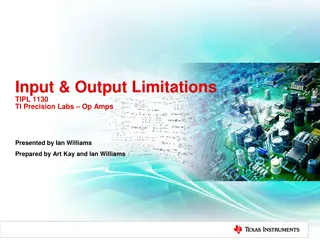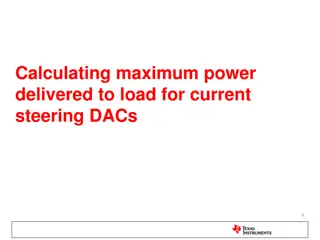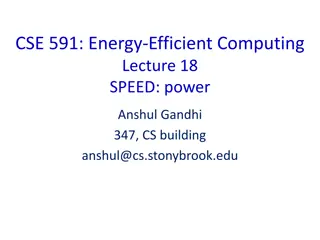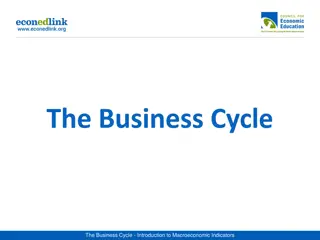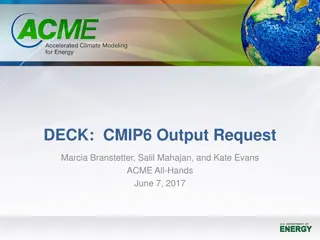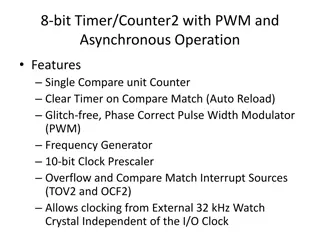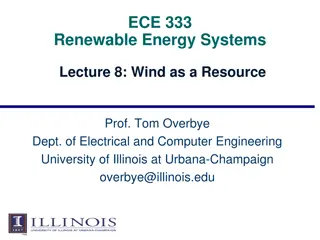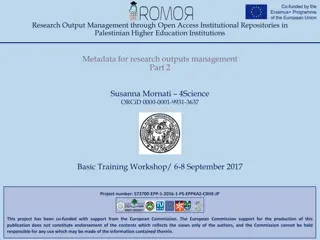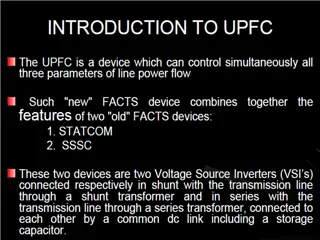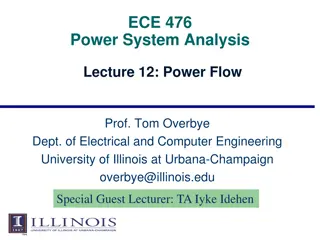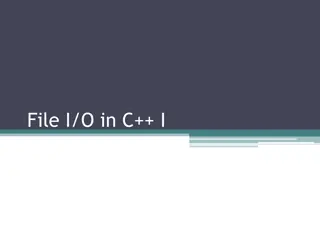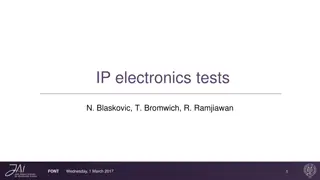Output Devices UNIT#4
Output devices in computing play a crucial role in displaying visual information to users. Monitors, including CRT, LCD, and LED types, provide visual output by showing pictorial forms on screens. Each type has distinct characteristics and resolutions. Graphics adapters help computers render graphic
1 views • 82 slides
Cisco Systems Fault Managed Power Portfolio Overview
Cisco Systems offers an industry-leading Fault Managed Power (FMP) patent portfolio comprising 24 active assets across seven INPADOC families. The portfolio includes patents supporting fault-managed power systems, PoE deployments, DC power distribution, DC-DC conversion, and HVDC connectors. The FMP
4 views • 4 slides
Petrovietnam Power Corporation Business Performance Announcement November 2023
Business performance announcement for November 2023 by Petrovietnam Power Corporation includes expected revenue, estimated results in the electricity market, contracted power output, provisional revenue, and power plant outputs. The announcement also covers the impact of weather conditions on operat
3 views • 7 slides
Understanding Input-Output Models in Economics
Input-Output models, pioneered by Wassily Leontief, depict inter-industry relationships within an economy. These models analyze the dependencies between different sectors and have been utilized for studying agricultural production distribution, economic development planning, and impact analysis of i
8 views • 7 slides
Improving Multi-Link Power Management Efficiency in IEEE 802.11 Networks
The document discusses challenges with per-link power mode changes in multi-link scenarios in IEEE 802.11 networks, proposing a solution for more efficient power management. It addresses issues such as latency and inefficiencies in signaling for power mode changes, introducing scheduled multi-link p
6 views • 9 slides
Understanding the Production Function in Economics
The production function is a vital mathematical equation that determines the relationship between factors of production and the quantity of output. This function plays a crucial role in optimizing production efficiency by assisting in decision-making related to input levels, output quantities, and c
0 views • 9 slides
Understanding Power Transfer and Impedance Matching in Circuits
Exploring the concept of maximizing power transfer between a source and load through impedance matching. Learn about complex conjugates, real and magnitude of complex numbers, average power in circuits, and the importance of minimizing reflected power. Discover how incident, reflected, and delivered
3 views • 33 slides
Understanding Input and Output Devices in Computing
In computing, input and output devices play a crucial role in enabling communication between users and computers. Input devices are used to enter data into a computer, while output devices display or provide the results of processed information. Common input devices include keyboards, mice, and joys
0 views • 17 slides
Understanding Basic Input/Output Operations in Computer Organization
Basic Input/Output Operations are essential functions in computer systems that involve transferring data between processors and external devices like keyboards and displays. This task requires synchronization mechanisms due to differences in processing speeds. The process involves reading characters
0 views • 11 slides
Understanding Cardiac Output and Venous Return in Cardiovascular Physiology
Cardiac output, stroke volume, end-diastolic and end-systolic volumes play vital roles in cardiovascular function. Factors affecting cardiac output include physiological conditions and pathological states like hyperthyroidism and myocardial infarction. Venous return, controlled by mechanisms like Fr
0 views • 27 slides
Understanding Regression in Machine Learning
Regression in machine learning involves fitting data with the best hyper-plane to approximate a continuous output, contrasting with classification where the output is nominal. Linear regression is a common technique for this purpose, aiming to minimize the sum of squared residues. The process involv
1 views • 34 slides
Understanding Functions and Graphs in Mathematics
Functions are a fundamental concept in mathematics used to describe relationships in the real world. They can be represented through equations, graphs, tables, or verbal descriptions. A function maps elements from a domain to a range, where each input has a unique output. The domain encompasses all
0 views • 4 slides
Power Analysis and Efficiency Calculations for Three-Phase Induction Motors
The provided content discusses the power relations and efficiency calculations for two examples of three-phase induction motors. It covers topics such as air gap power, power converted, output power, stator copper losses, rotor copper losses, core losses, stray losses, and efficiency calculations. D
0 views • 16 slides
Association of Renal and Cerebral Near Infrared Spectroscopy with Low Cardiac Output in Single Ventricle Patients
Near-infrared spectroscopy (NIRS) has been studied in infants after Stage I palliation surgery to assess its association with low cardiac output and adverse outcomes. This retrospective study investigated postoperative cerebral and renal NIRS values in infants with single ventricle physiology. Resul
0 views • 13 slides
Understanding Power Supplies and Rectifiers in Electrical Systems
Power supplies play a crucial role in converting AC power to DC power, with two main types being unregulated and regulated. Regulated power supplies consist of essential components like a step-down transformer, full-wave rectifier, filter circuit, and voltage-regulating circuit. Rectifiers are devic
0 views • 25 slides
Efficient Class B Amplifier Operation and Power Calculation
Class B amplifiers offer greater efficiency compared to single transistor Class A operation. This article covers the push-pull operation of Class B transistors, input DC power calculations, connecting push-pull amplifiers to loads, output AC power measurement, efficiency calculation, and power dissi
0 views • 28 slides
Understanding Machines: Work, Forces, and Efficiency
Machines play a vital role in making work easier by increasing force, distance, or changing the direction of applied force. Different types of machines like levers, pulleys, and inclined planes simplify work processes. Understanding input and output forces, as well as input and output work, is essen
1 views • 10 slides
Do-more Technical Training: Coil/Bit Output Instruction Set
Learn how to utilize the Coil/Bit Output Instruction Set in Do-more Technical Training. This set covers various functionalities including Unconditional END, Trailing Edge One-Shot, Output Reflection, Leading Edge One-Shot, Push On/Push Off, and Reset operations. Understand how each instruction works
0 views • 11 slides
Overview of Computer Input and Output Devices
Input devices of a computer system consist of external components like keyboard, mouse, light pen, joystick, scanner, microphone, and more, that provide information and instructions to the computer. On the other hand, output devices transfer information from the computer's CPU to the user through de
0 views • 11 slides
Understanding Solar Power: Advantages, Disadvantages, and Working Principles
Solar power is a renewable energy source that has gained popularity due to its cleanliness, affordability, and sustainability. Discover the history of solar energy, how it works, its advantages, like being inexhaustible and cheap, as well as disadvantages such as low output and weak efficiency. Lear
1 views • 9 slides
Understanding Input and Output in Programming: A Comprehensive Guide
This content provides detailed explanations and examples on input and output handling in programming, focusing on concepts such as I/O as State, typed output, and consuming input lists. It covers topics like using print statements, scanning inputs, and building output lists in programming languages.
0 views • 44 slides
Comparison Analysis of LMK04832 vs LMK0482x
General specifications comparison between LMK04832, LMK04828, LMK04821, and LMK04826 including parameters like VCO frequency range, maximum output frequency, input frequencies, PLL specifications, supply voltage, operating temperature, and output formats. Clock output formats, dividers, and delays d
0 views • 5 slides
Soft Start Simulation Results for TPS82150 Power Module
Results of soft start simulations for TPS82150 power module show that the rise time for output voltage slightly exceeds the expected soft start time due to voltage ramping up to 0.8V only. Different scenarios for input voltage and output current levels are explored, highlighting the impact on rise t
0 views • 4 slides
Understanding Op-Amp Output Swing Limitations in Linear Applications
Explore the limitations of op-amp output swing in linear applications, focusing on the non-linear behavior when driven into saturation. Learn how open-loop voltage gain affects output swing and the implications of operating closer to the rails. Check datasheet specifications for op-amp constraints a
0 views • 5 slides
Understanding Input and Output Limitations in Op Amps
Explore the various input and output limitations in TI Precision Labs Op Amps as presented by Ian Williams and prepared by Art Kay and Ian Williams. Delve into common mode voltage, voltage swing, data sheet parameters translation, input and output stages, examples of common mode voltage, and potenti
0 views • 15 slides
Calculating Maximum Power Delivery to Load in Current Steering DACs
In the process of calculating the maximum power delivered to the load for current steering DACs, several steps are involved, such as determining the peak-to-peak voltage at the DAC output, converting it to RMS voltage, calculating power delivered to the load, and converting power to dBm. Examples wi
0 views • 5 slides
Exploring Power Efficiency in Computing Systems
In this lecture series on energy-efficient computing, various concepts related to dynamic frequency scaling, power capping, power shifting, power modeling, and power measurement are discussed. The impact of power on server speed is explored, alongside strategies for improving performance within powe
0 views • 17 slides
Comparison of Electricity Power Systems Between CEPC and FCCee
The evaluation and comparison of electricity power systems between the CEPC and FCCee accelerators reveal the power breakdowns, RF power consumption, magnet power supply, and overall power usage. Differences in power consumption for various components such as RF, magnets, and vacuum systems are high
0 views • 19 slides
Understanding the Business Cycle in Macroeconomics
The business cycle refers to the fluctuations in an economy, with phases like peak, expansionary, trough, and contractionary. During expansionary phases, output increases, unemployment decreases, and inflation may rise. Conversely, contractionary phases see output decline, unemployment rise, and red
0 views • 6 slides
CMIP6 Output Requests and Atmosphere/Land Fields Overview
This presentation deck outlines the CMIP6 output request presented at ACME All-Hands meeting in June 2017. It includes detailed information on various atmosphere and land fields that are both part of and not part of the ACME output, covering parameters like radiation, moisture, carbon flux, and vege
0 views • 8 slides
Understanding Timing Models in Cell Design Environments
Delve into the intricacies of timing models for cells in design environments, exploring factors affecting delay, output transitions, linear and non-linear models, and the use of table models in cell libraries to specify delays and timing checks. Discover how input transitions and output capacitance
0 views • 11 slides
8-bit Timer/Counter2 with PWM and Asynchronous Operation
The 8-bit Timer/Counter2 with PWM and Asynchronous Operation features single compare unit, glitch-free operation, phase-correct PWM, frequency generator, clock prescaler, interrupt sources, and external clocking options. It includes registers for control, counter, output compare, asynchronous status
0 views • 14 slides
Understanding Wind Power Generation: Key Concepts and Calculations
Exploring wind power generation concepts, this content delves into the physics behind harnessing wind energy, calculating power in the wind, understanding the impact of wind speed on power generation, and correlating wind turbine size with efficiency and cost-effectiveness. Key equations and example
0 views • 28 slides
Research Output Management in PS Higher Education: FAIR Metadata Principles
Research output management in higher education focuses on making scholarly output findable, accessible, interoperable, and reusable through the implementation of FAIR metadata principles. The digital ecosystem surrounding scholarly publications faces barriers like fragmented repositories, varied app
0 views • 22 slides
Overview of Unified Power Flow Controller (UPFC) in Power Systems
A Unified Power Flow Controller (UPFC) is a combination of a Static Synchronous Compensator (STATCOM) and a Static Synchronous Series Compensator (SSSC) interconnected via a common DC link. UPFC allows bidirectional flow of real power and provides concurrent real and reactive series line compensatio
0 views • 20 slides
Understanding Leadership and Power Dynamics
Power and leadership are interconnected concepts, with power being the measure of a person's ability to influence others. Leaders have power in various situations, but it does not necessarily mean having power over people. Effective leaders balance their use of power with knowledge and trust, knowin
0 views • 9 slides
Power System Analysis: Lecture on Power Flow
Lecture 12 on Power Flow Analysis in Power Systems covers the use of power balance equations when analyzing complex power consumption and generation. It explains the derivation of real power balance equations for iterative solutions in power flow analysis. The lecture highlights the need for iterati
0 views • 30 slides
Understanding Fossil Fuels: Advantages, Disadvantages, and Impact
Fossil fuels like oil, coal, and natural gas have both advantages and disadvantages. They offer cheap energy with a high power output but contribute to pollution and are non-renewable. The method of processing fossil fuels in power plants is explained, highlighting their impact on the environment an
0 views • 11 slides
Understanding File Input/Output (I/O) in C++
File Input/Output (I/O) is an essential concept in C++ programming, allowing for interaction with files stored on secondary storage devices. This involves steps like including the fstream header file, declaring file stream variables, associating them with input/output sources, opening the file, perf
0 views • 19 slides
Anomalous IP Processing Electronics Diagnostic Tests
Repeating some anomalous IP processing electronics diagnostic tests on the first stage and the limiter. Tests include checking for unwanted harmonics in the frequency multiplier output and observing changes in the output power with varying input power. Issues with the output of the limiter diode and
0 views • 15 slides




